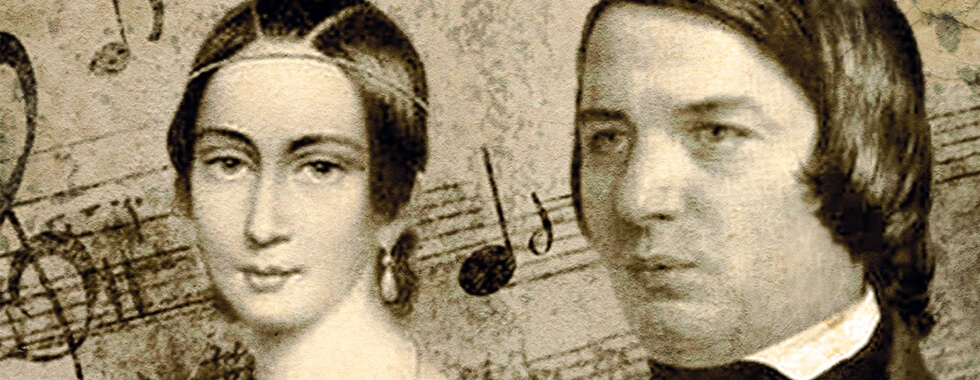For The Love of Schumann
This month, we celebrate not one composer, but rather two! I don’t think it’s any accident that we have chosen February, the month in which we celebrate family and love, to recognize one of the greatest musical couples of all time: Robert and Clara Schumann.
Robert first met Clara Wieck when he started taking piano lessons from her father, Friedrich, in 1828. Although Clara was only 9 at the time (Robert was 18), she was already starting to make a name for herself as a concert pianist. Robert was so taken with her playing that he abandoned his legal studies and dedicated himself to lessons with the elder Wieck. By 1832, Robert had to give up his own dreams of becoming a concert pianist because of a debilitating injury to a finger on his right hand, perhaps caused by practicing took much, so he devoted himself to composing, initially primarily for the piano.
In 1837, Robert openly declared his love for Clara and proposed marriage.
His proposal was accepted happily by Clara, but refused by her father, who was concerned that Robert, as a relatively unknown composer, would not be able to support Clara, and that the marriage would derail her burgeoning career as a performer. Indeed, one critic, after hearing Clara play a recital in Vienna, wrote, “The appearance of this artist can be regarded as epoch-making… In her creative hands, the most ordinary passage, the most routine motive acquires a significant meaning, a colour, which only those with the most consummate artistry can give.” The young lovers were not deterred, however, and met in secret while they challenged Friedrich’s refusal in court. They won their case three years later and were married in September 1840.
The Schumanns were absolutely devoted to each other for the entirety of their marriage, which lasted until Robert’s untimely death in 1856. Robert was so overjoyed with the union that he devoted 1840 almost entirely to writing lieder (art songs), a genre that he had earlier derided as inferior. He wrote over 140 songs that year, leading historians to dub it his Liederjahr (Year of Song). Included in this remarkable output is one of Robert’s most passionate outpourings of love, the sumptuous “Widmung,” the first song in a cycle called Myrthen (Opus 25). Robert borrowed Schubert’s Ave Maria melody for the song (it was one of Clara’s favourites).
In this song, his love for Clara is on full display:
Du bist die Ruh, du bist der Frieden/ Du bist von Himmel mir beschieden./ Daßt du mich liebst, macht mich mir wert. [You are rest, you are peace/ You are from heaven to me./ That you love me makes me worthy.]
Robert gave to Clara a “wedding diary” as a gift when they were first married. The couple both wrote in it over the next few years, providing fascinating insight into the early years of their marriage. In it Clara reveals her first pregnancy (“… there are so many things that burden a poor father of the family, which soon is what my Robert will ultimately end up being!!!!”), her frustrations at not being able to compose or practice as she would like (“My piano playing again falls completely by the wayside, as is always the case when Robert composes.”), and her plans for a birthday present for Robert (“This week I sat down a lot to compose, and finally succeeded with four poems by Rückert for my dear Robert. May they satisfy him just a little, then my wish will be fulfilled.” Unfortunately, we also see the strain on Robert as he became more and more ill. On his birthday in 1842, he writes, “But I was melancholy and unwell on that day. In the evening, we cheered ourselves up; several acquaintances were there, and much wine flowed into grateful throats. Yet the best thing after that was music, which Clara gave us as yet.”
Robert suffered from bouts of depression from an early age, perhaps stemming from losing his bother and sister-in-law to cholera in 1833, and he had a full-fledged breakdown in 1844 after a long concert tour in Russia with Clara. By 1854, his illness reached its peak, and he had himself admitted into a sanatorium, where he died two years later. Clara never re-married, although she did have a very close relationship with Johannes Brahms which verged on romance, remaining a widow until her own death 43 years later.
Robert’s importance in the history of Romantic music is fairly well-known already, but Clara’s contributions are far less familiar.
She was recognized widely as a highly influential performer, being one of the first to perform from memory. She also changed concert programs, moving away from the bravura pieces of the early 19th century towards programs devoted to her own pieces and those of leading composers of the time. She was the first known performer to feature the music of Brahms in her concerts, and she spent much of her widowhood promoting Robert’s music. Without her dedication to her dead husband’s compositions, it is doubtful that he would hold such an important position in the history of piano music today, especially since newer composers such as Liszt and Chopin threatened to displace Robert’s music in the latter half of the 19th century.
This month, whether you play piano or sing, it would be easy for you to find a piece by either of these wonderful composers to add to your repertoire. A good place to start for those new to the Schumann’s would be the Album für die Jugend (Album for the Young), Op. 68. It is a collection of 43 short piano works written by Robert in 1848 for his three daughters. The first 18 pieces are appropriate for beginner piano pieces, while the remaining 25, labelled Für Erwachsenere, will provide greater challenge for the more advanced students. Good luck, and have fun!
Youtube Link: Widmung op. 25 nº 1 (Schumann) – Diana Damrau

